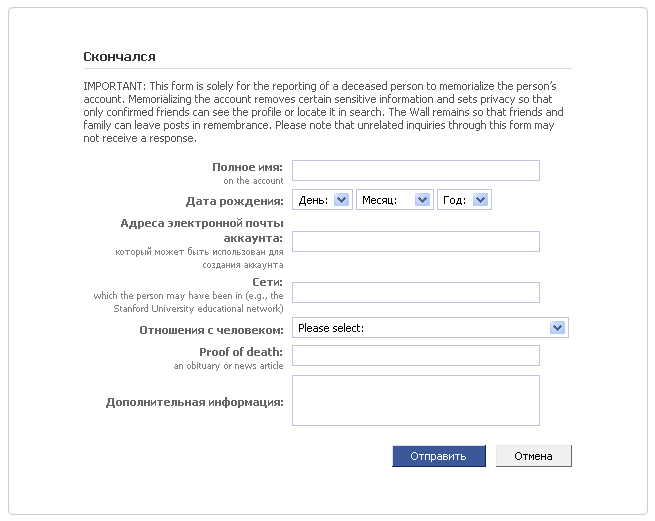Facebook and dead users
Large social networks unite a lot of people. And all new and new users replenish them. But users leave social networks. And both on their own, and for natural reasons.
Alas, but all people are mortal, users of social networks are no exception. And since the social network is a certain model of public relations, sooner or later this aspect should be reflected in them.
The first (it seems, the first) similar functionality was offered by Facebook. It is understandable, in the largest network and deceased users should be more than in other networks.
')
However, it was not without personal motives. As Facebook employee Max Kelly writes in a corporate blog, his close friend died a few weeks ago , after which he had the idea that the deceased person could not use the social network, but his friends and relatives still remember him.
As a result, the following functionality was added to Facebook:
Anyone who is a relative or friend of a Facebook user can use a special form to inform the administration about the untimely death of their loved one.

Russification of the form leaves much to be desired. In particular, the heading of the page “Facebook has passed away” is quite ambiguous. But nevertheless, Russian-speaking users can use the page.
It remains not entirely clear how the administrators will check whether a person has really passed away, it remains to hope that the jokers will not abuse the form.
The pages of dead people will be frozen, it will be impossible to log in under their account, only those whom they have added as friends will be able to find them in the search, some personal information (contact information and statuses) will be hidden. Also, they will not be displayed in the "you may know" list and other offers that are abundantly scattered on Facebook pages. At the same time, the user's wall will continue to function so that family and friends can leave kind words about the deceased there.
Alas, but all people are mortal, users of social networks are no exception. And since the social network is a certain model of public relations, sooner or later this aspect should be reflected in them.
The first (it seems, the first) similar functionality was offered by Facebook. It is understandable, in the largest network and deceased users should be more than in other networks.
')
However, it was not without personal motives. As Facebook employee Max Kelly writes in a corporate blog, his close friend died a few weeks ago , after which he had the idea that the deceased person could not use the social network, but his friends and relatives still remember him.
As a result, the following functionality was added to Facebook:
Anyone who is a relative or friend of a Facebook user can use a special form to inform the administration about the untimely death of their loved one.

Russification of the form leaves much to be desired. In particular, the heading of the page “Facebook has passed away” is quite ambiguous. But nevertheless, Russian-speaking users can use the page.
It remains not entirely clear how the administrators will check whether a person has really passed away, it remains to hope that the jokers will not abuse the form.
The pages of dead people will be frozen, it will be impossible to log in under their account, only those whom they have added as friends will be able to find them in the search, some personal information (contact information and statuses) will be hidden. Also, they will not be displayed in the "you may know" list and other offers that are abundantly scattered on Facebook pages. At the same time, the user's wall will continue to function so that family and friends can leave kind words about the deceased there.
Source: https://habr.com/ru/post/73535/
All Articles